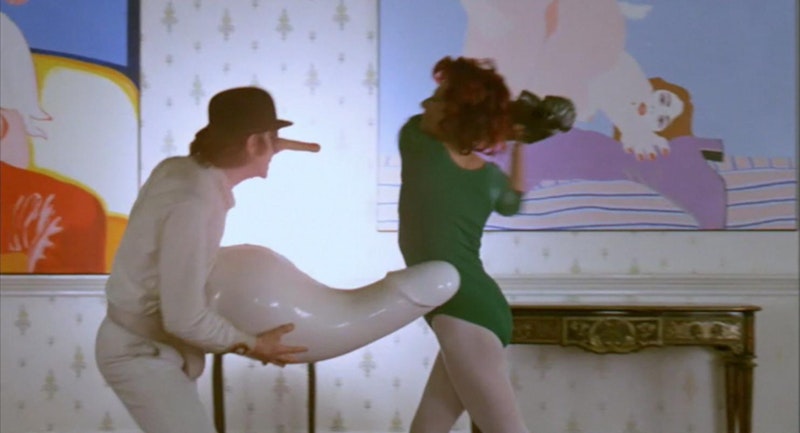In Stanley Kubrick’s A Clockwork Orange, the “Cat Woman” at the Health Farm—after Alex has broken into her house and they’re parrying, Alex swinging a giant phallus sculpture and she, a bust of Beethoven—yells ”I’ll teach you to break into real people’s houses!” This line has stuck in my mind for years. She’s saying that he doesn’t structurally count in society. And the film bears this out. Alex, despite his ultra-violent behavior and charismatic destructiveness, is the one used, not the user. He counts for nothing, the pawn in the hands of the Real People, whether they’re scientists, politicians or social theorists.
The same theme is found in other Kubrick films. There’s the ending of Dr. Strangelove, where the choice of who’ll go into the subterranean bunkers and who’ll be left above to die of radiation poisoning is mentioned. Or Barry Lyndon’s desire to be real, part of the aristocratic power structure. He discovers that he just doesn’t belong. It occurs again in The Shining when Jack Torrance is seduced by the upper-class ghosts in the Overlook Hotel. So strong is his desire to be part of their select circle that he goes on a murderous rampage to validate himself. Finally, there’s Bill Harford’s desire to attend the secret party of the cabalistic elite in Eyes Wide Shut. He can’t accept that he doesn’t belong, isn’t Real. What does it mean to be Real?
Kubrick’s films suggest that one’s relationship to power is the key factor. Real people are those have some relation to the power structure. At an earlier time, this would’ve meant the reigning Monarch. Consider the court of Versailles, constructed by Louis XIV for himself and select members of his entourage. It was infinitely more advantageous to assist the King with his morning bowel movement at Versailles than to have a manor and a hundred servants far from the court. The same principle applies to living in big cities or being part of institutions, both power centers; one feels closer to where the action is, where things can happen.
Some might think that it’s a purely question of money, yet money doesn’t necessarily supply the enigmatic quality of the Real. This is the lesson learned from Barry Lyndon. On occasion, I’ve heard someone summarily dismissed from the halls of the Real by the damning phrase “a trust fund kid,” meaning “so and so is a paid-for faker”; a faker to be envied, but one having no claims to structural Reality. Being part of the power structure, to be real, is a question of the predisposition of one’s soul. Not everyone gets invited to the Party.
Real people are attractive in an almost magnetic sense. We’re trained to look at them, these arbiters of taste, influencers and experts; whether on TV, on Instagram, in magazines, in films, everywhere. We’re Real only to the degree that we’re the watched and not the watchers. There’s a great scene in Flaubert’s Madame Bovary where Emma Bovary, invited to an aristocratic party, mounts the steps to the Ballroom and sees the faces of the peasants pressed up against the widows. Conscious of being watched, she feels Real, she wants to stay in that elite world forever. This leads to her ruin: Madame Bovary couldn’t accept that she, too, just didn’t count.
Once on a playground, here in Paris, a little girl was playing with my son. They ran over to me and I asked her the standard grown-up question of what she wanted to be as an adult. She said, “I want to be on TV.” I found this depressing for it suggested no specific activity, no real interest, nothing other than being looked at. Yet didn’t her reply reveal a basic truth? She wanted to be watched: she wanted to be Real.
Perhaps the only people outside of the power structure who have unchallenged claims to Reality are the optimistic young, those who haven’t yet had the chance to fail, stall and confront insurmountable obstacles. They live in the world of Expanding Future Possibilities, not that of Contracting Unrealized Hopes. Yet, for those who occasionally feel themselves in the latter category, remember, it’s just a state of mind. Don’t give up!

